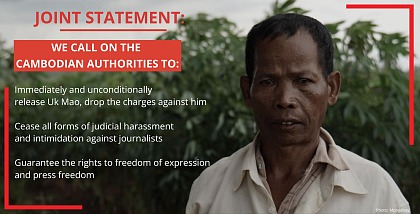Immediately Release and Drop the Charges Against Environmental Reporter Uk Mao
Published on 21 May 2025; Joint OrganizationsWe, the undersigned civil society organizations, media associations, and human rights defenders, are dismayed by the arbitrary arrest and indictment of environmental journalist Uk Mao, indisputably carried out in response to his reporting on deforestation. Uk Mao is in pretrial detention in Stung Treng prison on charges of incitement to commit a felony and public defamation. We call for Mao’s immediate and unconditional release from prison and the charges against him to be dropped.
Uk Mao was arrested at his home by two men on 16 May 2025, one of whom appeared to be a plainclothes officer. No arrest warrant was presented. According to Mao’s wife, the officers told her husband that “their boss wanted to speak to him about a piece of land.”
This arrest is the most recent incident in a disturbing trajectory of intimidation, violence and threats against Mao, beginning in June 2024. He was questioned by military police in response to his investigation of land-clearing in Phnom Chum Rok Sat community forest in Stung Treng. In August, he helped the outlet Mongabay to uncover that a mining company with links to the Cambodian military was illegally logging the forest. Following the publication of the story in September, Mao himself was conversely charged with illegally clearing state-owned forest and incitement, and placed under judicial supervision indefinitely. The baseless and bizarre charges were brought despite Mao’s recognition as a long-standing defender of Cambodia’s forests.
On 24 March 2025, he was physically assaulted by three individuals — reportedly former provincial officials — whilst returning from documenting alleged illegal deforestation in the Prey Lang community forest. The attackers demanded that Mao delete the footage he had captured in the forest. The attack caused minor injuries and resulted in the destruction of his smartphone. Mao filed a complaint with the district police on 26 March, but was informed that a counter-complaint had been filed against him. Authorities refused to disclose the identity of the complainant and requested Mao to delete the video he had posted online of the attack. Subsequently, on 29 April, the Stung Treng Provincial Court issued a summons for Mao to appear on 20 May in connection with the incident.
Mao is currently facing as many as 15 legal complaints, a concerning misappropriation of the judicial system to attempt to silence his environmental reporting. The levying of numerous cases, each carrying significant prison sentences and fines, must be viewed as a concerted effort to present an insurmountable legal and financial challenge for Uk Mao, with the aim of making it impossible for him to continue reporting on environmental crimes. It is testament to the power of his reporting, which exposes the involvement of those with power and influence in the clearing of Cambodia’s forests.
For this very reason, the harassment of Uk Mao is part of a broader and growing effort to intimidate and silence journalists and environmental defenders in Cambodia who highlight the exploitation of the country’s natural resources and environment and the culpable actors. Recent examples include the conviction of six Mother Nature environmental activists and the baseless exile of international environmental journalist Gerald Flynn. Those who financially and politically gain from deforestation and environmental exploitation occupy high positions of power, meaning that the exposure of involvement in such illicit activities is met with significant ire and swift retribution, primarily through the legal system.
In 2024, CamboJA documented 41 cases of harassment involving at least 64 journalists. Legal harassment was the most common, with five journalists placed in pre-trial detention and one tragically killed while carrying out their work. In early 2025, three further journalists were detained on charges of incitement. Such an environment is captured by Reporters Without Borders’ (RSF), assessment of press freedom in Cambodia, which in 2025 was ranked as 161st out of 180 countries. This represents a drop of 33 places since 2016.
We call on the Cambodian authorities to:
The targeting of journalists through violence, threats, and legal harassment not only undermines individual freedoms but also weakens democracy, public trust, and environmental governance and protection. Uk Mao’s case must not become yet another example of impunity and repression.
We stand in solidarity with all journalists courageously working to expose environmental crimes and protect public interest.
This joint statement is endorsed by:
1. Cambodian Journalists Alliance Association (CamboJA)
2. Cambodian Center for Independent Media (CCIM)
3. Cambodian Center for Human Rights (CCHR)
4. Cambodian Human Rights and Development Association (ADHOC)
5. Cambodian League for the Promotion and Defense of Human Rights (Licadho)
6. Alliance Independent Journalists (AJI)
7. Gerakan Media Merdek (Geramm)
8. Centre for Independent Journalism (CIJ)
9. National Union of Journalists of the Philippines (NUJP)
10. Overseas Press Club of Cambodia (OPCC)
11. Committee to Protect Journalists (CPJ
12. Cambodian Institute for Democracy (CID)
13. Business & Human Rights Resource Centre (BHRRC)
14. Reporters Without Borders (RSF)
PDF: Download full statement in English - Download full statement in Khmer








